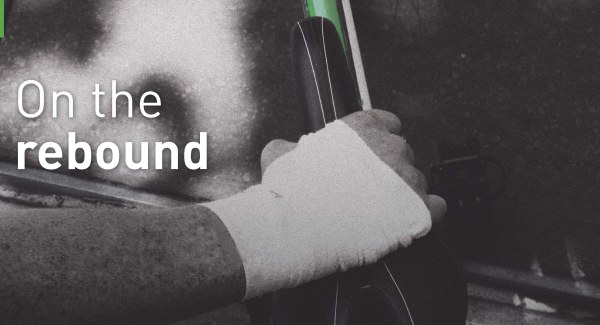Iain Treloar discovers that the physical wounds of a bad crash heal quicker than the mental ones.
It happened in a moment – drizzle-haloed streetlights, a double-parked taxi, merging across tram tracks to pass on the right, tyres slipping on the greasy surface, sliding out of control.
In a series of freeze frames I can replay it in my mind; the sharp twist of of my handlebars as they were wrenched from my grip, the eerie silence as I tipped over, and the meaty thud as my shoulder and hip hit the ground, paired with the clatter and grate of alloy on cement. Then a momentary sense of confusion as I lay still in the middle of the road.
It’s natural to blame others for our misfortunes, but there was no hot prickle of rage here – only a numb resignation. I was the only party at fault. I hadn’t crashed from heroic cornering in a brave alpine descent, or been taken out by a careless driver. I’d just overcooked it and failed to observe the risks of this mundane urban environment; the chastened self-pity I now felt was that of the guilty party, and not the victim. I walked my poor, battered bike the rest of the way home, let it fall on its side in the living room, and set about tending my wounds.
I dozed fitfully as bruises bloomed. My bedsheets were stained as my shoulder oozed, and the next morning I found more painful damage – fingernails almost ground through by the slide, a puffy and excruciating wrist, and a pulsating graze on my chin. For almost a fortnight I couldn’t ride at all – ligament damage can make squeezing a brake lever all sorts of teeth-gritting fun – but after a while I had to come to terms with the fact that any reluctance I felt wasn’t due to physical ailments. I was scared.
In a series of freeze frames I can replay it in my mind; the sharp twist of my handlebars as they were wrenched away, the eerie silence as I tipped over, and the meaty thud as my shoulder and hip hit the ground, paired with the clatter and grate of alloy on cement.
Now, I know the commonly accepted wisdom is that you’ve just got to get back on the bike – but that’s easier said than done. Living in the middle of the grid of tram-tracks that is Melbourne’s inner suburbs, potential trauma and its reminiscence was never far away. Crossing any major intersection became a fraught experience. In a momentary tumble, bike riding had turned from a pursuit of pure, instinctive joy into one where I second-guessed every pedal stroke and angle of attack. I was skittish – all nervous glances and hunched shoulders – fearful and timid.
The change began when I realised that I needed to accept the pain of the crash as a learning experience, and nothing more than that. The choice was mine whether to let it define my time in the saddle. I slowly began to rebuild affection for my bike. Ghoulishly blood-stained bar tape was removed and replaced. Brake levers were straightened. Shiny new pedals took the place of those scuffed in the crash. My bike once again looked like it belonged to someone that loved it.
As for the riding? It’s been a slow process of rebuilding confidence that made sense when I began to view my time on the bike as an ongoing journey rather than a series of smaller, daily events. It’s a constant evolution and learning experience, shaped in equal parts by past mishaps and triumphs. By conquering my fears and getting back in the saddle, this beautiful, long romance was able to continue – with a tram-track sized blip in the narrative.
Ride On content is editorially independent, but is supported financially by members of Bicycle Network. If you enjoy our articles and want to support the future publication of high-quality content, please consider helping out by becoming a member.


Thanks for sharing, Iain! I’m sure your insights will greatly comfort the next person who has a fall.
Yup, they last a long time. I was taken out by a car that ran a stop sign and 15 years later still flinch when I see vehicles approaching a stop sign even just slightly too fast for my liking…..
A great read that reflects the very real observation that a crash affects the mind as much as the body in most cases.